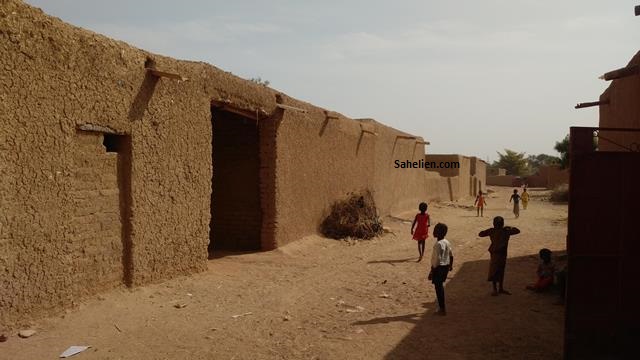The insecurity that has prevailed for several months in the Mopti region has caused many displaced people. Communities that once got along, have become suspicious.
Barbé, first village located at the exit of the city of Sevaré. It is 9:45 am. Our team leaves the city of Mopti to meet the displaced people of Sadia Peulh.
In the courtyard where Samba found refuge with his family, dozens of children, all shirtless and barefoot, are running in all directions. In the middle of the house is a shed. Samba and his guests welcome us.
Shy and suspicious at first, he tells us: “my only son was killed by some Donsos, I only had him”. The more questions poured, the more Samba becomes open and reassured by our presence. “The problem is that today Fulanis are automatically considered jihadists”, he laments. For Binta, his wife, the Donsos have always been hunters who go into the bush to kill animals. “Today, they no longer kill animals, they kill people” she worries and add, with tears in her eyes: “my son has never been a jihadist, he spent his days watching our herds, and they took him from me”.
“About 105 families left the village of Sadia-Peulh after the fire of their village … Some went to Bandiagara, others to Koro, some came to Mopti here, and the others continued to Bamako”, according to Mr. Dembélé, human rights defender in Mopti.
Since the arrival of jihadists coupled with the advent of traditional donsos or hunters in the region, the relationship of good neighborliness has completely deteriorated. Samba, in his sixties, his wife, his daughters-in-law and their children fled Sadia-Peulh months ago. They found refuge in Barbé.
Located in the circle of Bankass, Sadia-Peulh and Sadia-Dogon are two neighboring villages that have always coexisted in perfect harmony. The Fulani are traditionally breeders and the Dogon farmers. They had found a way to make their cohabitation enjoyable. It could happen sometimes that the herds of a Fulani enter the farm of a Dogon. A well-established rule and respected by all was law. It involved the owner of the herd to pay a fine of 250 FCFA per animal head to the owner of the farm.
According to Oumarou, a cousin of Samba, since the conflict erupted, residents of Sadia-Peulh can no longer go to Sadia Dogon for fear of being killed or tortured. “The State representatives have their offices in Sadia-Dogon. For our administrative documents needs, we had to go there. But here we can’t do it anymore”, he says.
“Several huts and houses were burned in Sadia-Peulh and the village is currently empty”, says Samba. Last December, four donsos hunters were arrested by the Malian army. They had been caught “in the act of destroying and burning houses”.
For Samba and his family, the absence of the State is one of the factors that triggered the crisis. Today, they want “peace and tranquility” and ask the State to “assume its responsibilities and do justice”.
Sahelien.com

